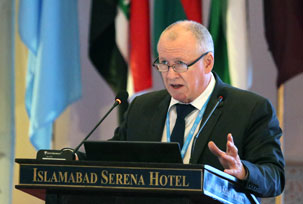
Islamabad, 10 October 2017 – A special session to review progress of the polio eradication programme in WHO’s Eastern Mediterranean Region was held at the Sixty-fourth Session of the WHO Regional Committee for the Eastern Mediterranean taking place from 9 to 12 October 2017 in Islamabad.
Addressing the Regional Committee on Tuesday 11 October, Chris Maher, manager of WHO’s regional polio eradication programme in Amman, Jordan, provided a situation update in the Region. According to Mr Maher, Pakistan and Afghanistan – the last two remaining polio-endemic countries of the Region - currently have the most extensive systems for identifying polio cases and stopping the virus from spreading any further.
Updating the Committee and participants on the number of wild polio virus cases reported this year - five in Pakistan and seven in Afghanistan - he added that the significant decline in the polio cases in year 2017 is a great indication that polio is close to eradication in these countries. He acknowledged the government’s continued commitment noting the unified efforts under the National Emergency Operation Centres (EOCs).
Speaking on the polio status in the Eastern Mediterranean Region, Mr Maher said that 270 million doses of oral polio vaccine were given in supplementary immunization activities to date in 2017. Moreover, he congratulated Somalia for completing three years without a case of polio. Mr Maher also updated on the circulating vaccine-derived poliovirus type2 (cVDPV2) outbreak in Syria which has reported 48 cases so far. In response to the outbreak, two immunization rounds have been conducted in Deir-ez-Zor governorate with monovalent oral polio vaccine type-2 (mOPV2), and one round in Raqqa governorate. Inactivated polio vaccine (IPV) is being used in addition to help boost immunity in children aged between 2 and 23 months in both governorates.
Prime Minister’s Focal Person for Polio Senator Ayesha Raza Farooq briefed the committee on efforts that Pakistan is taking to ensure the transmission is stopped in next few months. Ms. Farooq said that bringing partners and all government stakeholders together was probably the most crucial element of the recent successes. “Our ‘one team’ approach, data driven decision-making, vigilant oversight and accountability, and the most efficient support by our security agencies has brought us to the lowest number of wild poliovirus cases – five in 2017 so far,” she said.
The WHO Regional Committee is a platform where Ministers of Health from Member States and their representatives discuss important public health priorities for countries of the Region. The meeting in Islamabad was chaired by Minister for National Health Services Regulation and Coordination Mrs Saira Afzal Tarar, and attended by Director-General of WHO, Dr Tedros Adhanom Ghebreyesus, WHO Regional Director for the Eastern Mediterranean, Dr Mahmoud Fikri, along with more than 250 public health leaders and representatives from national, regional and international organizations.


